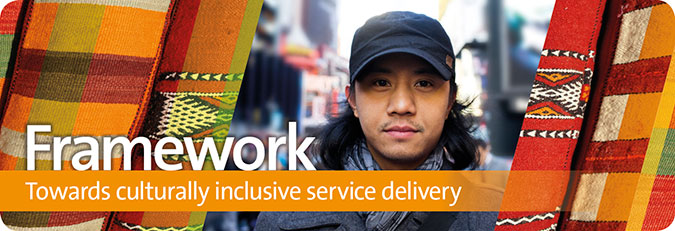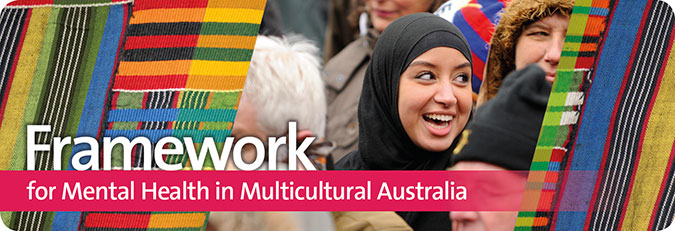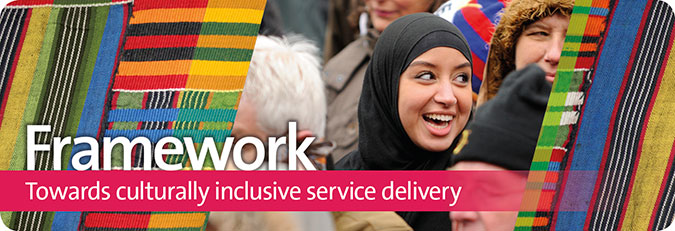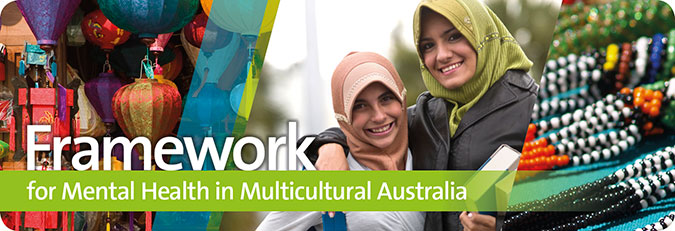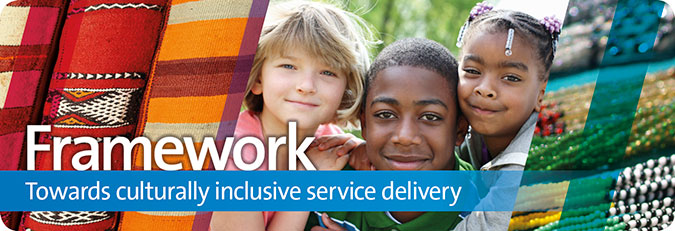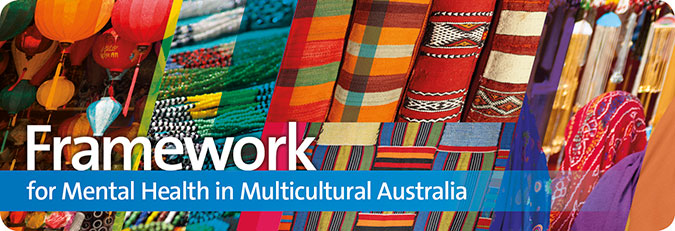Key concept 4
Consumer and carer participation
Consumer and carer participation with culturally and linguistically diverse (CALD) communities needs to be approached in a way that respects cultural differences and shows understanding of the needs of CALD consumers, carers and their families.
Consumer and carer participation with CALD communities needs to start with the mental health services actively engaging with their local CALD communities to build trust and tailored partnerships. Strategies for improving participation need to be multifocal and address jointly agreed goals.
Consumer and carer participation is a central principle in Australian government, state and territory mental health policies and plans. By comparison, very few consumers and carers from culturally and linguistically diverse (CALD) backgrounds are involved in mental health consumer and carer participation activities in Australia.
Participation involves a number of processes that facilitate contributions from consumers, carers and family members across a range of levels.
These include contributions at:
- The personal level: individuals, their families and carers are involved and have a voice in their own personal mental health care
- The service level: consumers and carers provide input into mental health service planning, development, delivery and evaluation
- The system manager and corporate levels: participation seeks to inform policy development and legislation.
It is important to acknowledge when seeking involvement from representatives from CALD backgrounds, to acknowledge that consumer and carer participation may be an unfamiliar concept. It may also be understood differently across diverse cultural groups. Many CALD communities don’t typically consider the users of mental health services as ‘consumers’ with the associated rights of choice and self-determination. Similarly, the notion of ‘participation’ implies non-universal concepts such as individual rights and selfadvocacy. The variety of mechanisms that are generally used to facilitate consumer and carer participation may not be accessible or applicable to CALD consumers, carers and their families.
It must also be recognised that participation is not an isolated social process, but one that occurs within, and is influenced by, community context. It is this community context that’s particularly relevant to CALD populations.
Essential strategies
The following strategies for organisations can create the foundations for strong CALD consumer and carer participation.
Background and preparation
- Locate a suitable venue which is culturally appropriate and comfortable for CALD participants.
- Seek out, respect and value explanatory models of mental health and mental ill health that deepen understanding of how mental health and distress is understood and expressed; what people call this experience; when, how and why help is sought; and what CALD communities consider to be a good outcome.
- Be open to reframing terminology for diagnosis and treatment associated with mental ill health.
- Generate and deepen trust. Take into account personal and perceived stigma, shame, guilt and embarrassment.
Implement tailored engagement and communication processes
- Engage family members, informal supports, or the wider CALD community where appropriate in discussion and education about mental health and mental ill health.
- Discuss and negotiate culturally appropriate interventions with CALD communities as part of a two-way information exchange and capacity building activity.
- Consider and use alternative communication mediums such as online and virtual mediums. The anonymous nature of online support may be more appropriate for some CALD communities.
- Ensure information obtained from CALD communities is translated into action which is timely, meaningful and of benefit to community members.
Sustainability
- Use alternative communication mediums, e.g. fotonovela and pamphlets.
- Demonstrate ongoing respect and concern for the community; ensure the purpose(s) of engagement serve to benefit the community in some meaningful sense; and build in mechanisms for follow-up and sustained engagement wherever feasible.
- Recognise that to enable and achieve ongoing authentic engagement with CALD communities in the area of mental health often takes considerable time and thoughtful planning.
Engaging CALD consumers and carers in participation
Participation in groups, networks and partnerships can deliver positive outcomes for all. However, this is least likely to occur amongst the most disadvantaged members of society. Particular attention must be paid to promoting and facilitating the involvement of these groups, or participation may have the unintended consequence of increasing social inequalities rather than reducing them.
Reports on the experience of CALD consumers in mental health care have highlighted consumer experiences of cultural insensitivity, institutional racism and culturally inappropriate care. Attempts to engage consumers and carers in participation within this current context, presents significant challenges. Insensitivity to the socio-cultural needs of CALD consumers and communities is identified as a key barrier to consumer and carer participation.
Additional barriers to participation include stigma and shame, differing explanatory models of mental illness, low levels of mental health literacy, and language barriers. Some of these barriers make voluntary access to mental health services unlikely, and consumer or carer participation even more unlikely. Efforts to engage CALD consumers and carers in participation need to address these barriers in innovative ways.
A critical first step is building trust with communities through community development. Participation can only occur when people feel comfortable talking about mental health and illness, and when mental health services develop their understanding of the needs of their local CALD communities. The development of dedicated strategies and partnerships targeting community engagement and improving mental health literacy can underpin successful participation.
Community engagement
Many traditional mechanisms for consumer and carer participation, such as formalised consumer advisory groups or representation on committees, fail to address the cultural context of mental health issues across CALD communities. Only limited outcomes can be achieved through group processes where participants have varying degrees of English language proficiency, and different understandings and beliefs about mental illness. One successful model for CALD consumer and carer participation has a focus on community engagement as its foundation. In this model, the mental health service actively engages with the community, rather than requiring community members or representatives to engage with the mental health service. Community engagement can occur with established community groups, community elders, leaders and mentors, targeted sections of communities, multicultural organisations or across communities as a whole. This type of engagement can assist mental health services to identify and understand how mental health issues are understood within CALD communities, help build trust between communities and services, increase mental health literacy, and identify culturally appropriate engagement strategies. These preparatory stages can lead to successful tailored partnerships and participation approaches.
Useful readings
Baker, A., Procter, N.G. and Szokalski, M (2013) Engaging with CALD communities to reduce the impact of depression and anxiety: A review of current evidence, Adelaide, University of South Australia, Sansom Institute for Health Research.
Queensland Transcultural Mental Health Centre, (2006). A model for CALD consumer participation in mental health: A report on the multicultural consumer and community participation in mental health project, Brisbane, Qld Transcultural Mental Health Centre and Multicultural Centre for Mental Health and Wellbeing.
Romios, P., McBride, T. & Mansourian, J., (2007). Consumer participation and culturally and linguistically diverse communities: A discussion paper, Melbourne, Health Issues Centre.
 Key Concept 4 - Consumer and carer participation (215 KB)
Key Concept 4 - Consumer and carer participation (215 KB)
Previous Page


